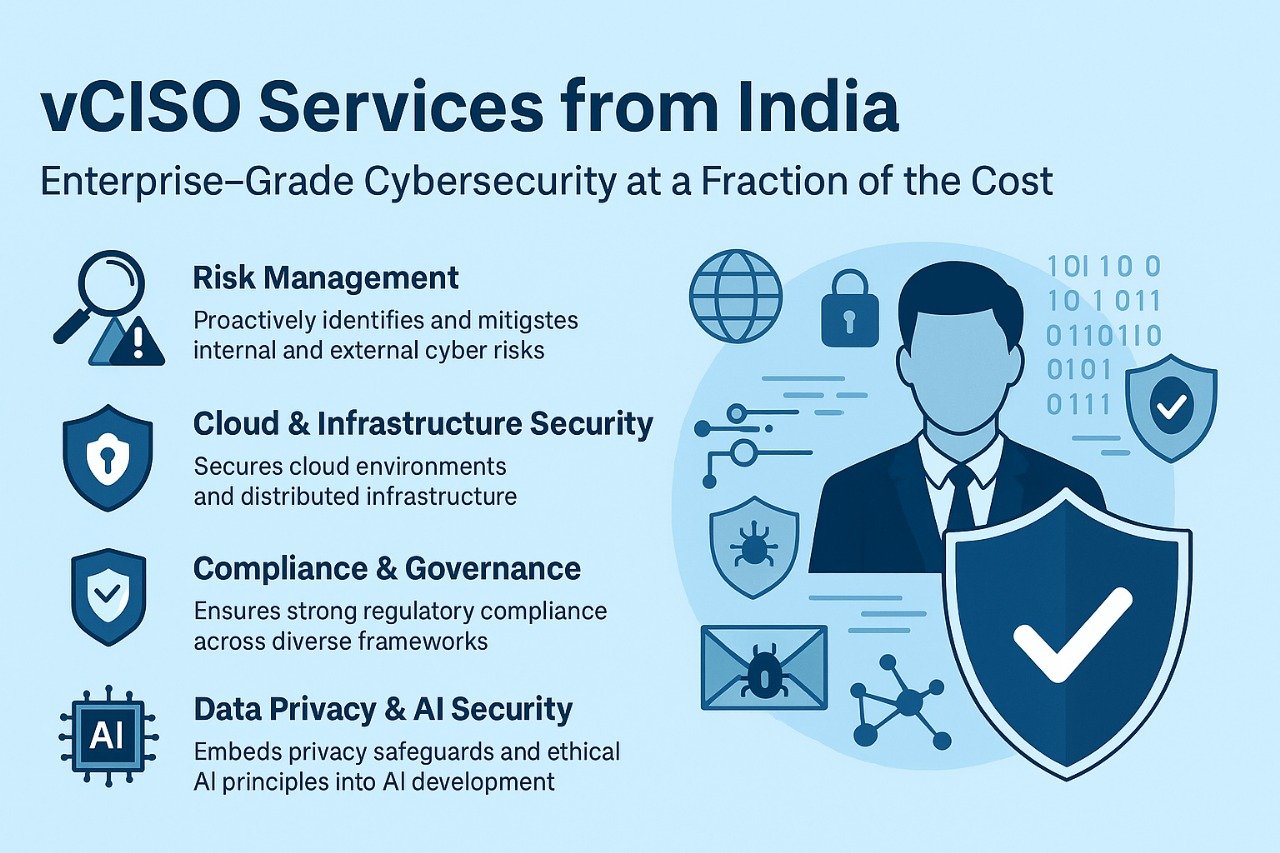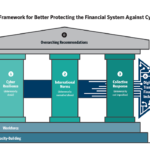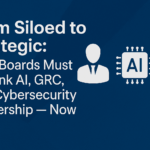vCISO Services from India: Practical, Scalable Cybersecurity Leadership for Modern Enterprises
In today’s interconnected and AI-driven digital environment, cybersecurity threats are growing not only in volume but in sophistication. Organizations—ranging from fast-moving startups to expanding mid-sized firms and complex global enterprises—face mounting pressure to manage regulatory compliance, protect sensitive data, and secure emerging technologies such as artificial intelligence and distributed cloud infrastructure.
Yet for many, building a full-time Chief Information Security Officer (CISO) function remains a challenge. Long hiring cycles, high costs, and limited access to multi-domain expertise often make traditional security leadership impractical—especially for businesses operating in dynamic or resource-constrained environments.
The Virtual CISO (vCISO) model provides a pragmatic alternative. By engaging a team of experienced cybersecurity professionals—often based in India—organizations can gain access to senior-level strategic guidance and operational capability without incurring the overhead of a permanent executive hire.
Unlike one-size-fits-all consulting, a team-based vCISO approach offers structured coverage across the key domains of cybersecurity: governance, technical architecture, compliance, cloud, AI security, and incident response. This model supports scalable, programmatic security tailored to an organization’s maturity level, business model, and regulatory landscape.
What is a vCISO?
A Virtual Chief Information Security Officer (vCISO) is not just a remote security consultant—it’s an on-demand, strategic cybersecurity leadership service delivered by a high-calibre team of seasoned professionals. This model enables organizations to access executive-level security guidance without the cost, complexity, and delay of hiring a full-time CISO.
Rather than relying on a single person to cover the vast and complex landscape of cybersecurity, the vCISO model—particularly when delivered from India—leverages a specialized team approach, giving enterprises immediate access to diverse, deep-domain expertise across critical functions.
Here’s how a vCISO team supports and secures your enterprise:
- Risk Management – A vCISO team proactively identifies and mitigates both internal and external cyber risks before they escalate. They establish and maintain risk registers, conduct business impact assessments, and guide risk treatment plans aligned with business priorities and global best practices (such as ISO 27005 and NIST CSF).
- Cloud & Infrastructure Security – Whether you’re operating in AWS, Azure, GCP, or hybrid environments, vCISOs provide architecture reviews, cloud posture hardening, segmentation strategies, and identity/access governance. With deep expertise in zero trust, SIEM/SOAR, and EDR/XDR platforms, they protect everything from endpoints to edge.
- Compliance & Governance – From industry standards like ISO 27001, SOC 2, and HIPAA, to regional data protection laws like GDPR, India’s DPDPA, and CCPA, a vCISO ensures that your organization maintains a strong compliance posture. They create policy frameworks, prepare audit-ready documentation, and support cross-border data flows while minimizing business disruption.
- Data Privacy & AI Security – As AI becomes central to digital transformation, new security and ethical challenges emerge—from model poisoning to prompt injection and data drift. The vCISO team includes AI security specialists who:
- Inventory and classify your AI/ML assets
- Perform threat modelling on algorithms, datasets, and inference paths
- Apply frameworks like NIST AI RMF and ISO/IEC 42001
- Implement access controls, model versioning, and adversarial defences tailored to your AI stack
- Establish AI governance structures that manage risks across the AI lifecycle, in alignment with AIMS (AI Management Systems)—including monitoring, explainability, fairness, and responsible usage policies
They ensure that privacy safeguards and ethical AI principles are embedded into AI development—making your innovation both secure and compliant.
- Threat Intelligence and Incident Response – Armed with global and regional threat intelligence feeds, the vCISO team builds resilient detection and response capabilities. They:
- Develop incident response playbooks
- Run tabletop exercises with key stakeholders
- Integrate threat hunting into existing SOC environments
In the event of an attack, they lead all response efforts—ensuring containment, forensics, remediation, and regulatory reporting are coordinated and timely.
- The Strategic Advantage – A vCISO team doesn’t merely protect your enterprise—they align security initiatives with business objectives. Whether you’re:
- Expanding into regulated markets
- Launching new digital products
- Pursuing certifications (ISO, SOC, PCI)
- Preparing for due diligence or funding rounds
— the vCISO team provides guidance to mature security posture while supporting broader business objectives such as compliance, scale, or audit readiness.
When delivered by a team based in India, the vCISO model offers unmatched value:
- Global delivery capability
- 24/7 support coverage
- Multidisciplinary expertise
- All at a fraction of the cost of a full-time CISO.

Why India?
India has rapidly emerged as a global cybersecurity powerhouse, offering deep technical capabilities, extensive delivery experience, and growing specialization across AI, cloud, and regulated industries. With a mature IT services ecosystem and a growing specialization in cybersecurity, India is uniquely positioned to deliver high value vCISO services to enterprises worldwide.
Indian vCISO teams comprise of certified, battle-tested professionals, holding globally recognized credentials such as CISSP, CISA, CCSP, OSCP, and ISO 27001 Lead Auditor—as well as specialized certifications in AI security, cloud platforms, and data privacy regulations.
What sets Indian vCISO teams apart?
- Global delivery with local compliance alignment – Teams are adept at mapping international security frameworks to region-specific regulatory environments, ensuring both compliance and business continuity.
- 24×7 security operations and response – With global time zone coverage and follow-the-sun delivery models, Indian teams offer round-the-clock monitoring, alert triage, and incident response, making them ideal for organizations with distributed operations.
- Expertise in emerging and specialized domains – Whether it’s securing large language models (LLMs), implementing zero trust architecture, or navigating complex data protection laws, Indian teams bring focused expertise that’s hard to match with a single in-house resource.
- Proven experience across industries – From FinTech to HealthTech, eCommerce to SaaS, Indian vCISOs have supported hundreds of security programs globally making them adaptable to your sector, your risk profile, and your goals.
- mapping
The Value of a Team Over a Single CISO
Cybersecurity is no longer a siloed responsibility—it’s a vast, multi-domain discipline that requires continuous coverage, specialized expertise, and the agility to adapt to emerging threats. From developing a zero-trust architecture to managing AI model risks, navigating data privacy laws, and leading incident response, the demands placed on modern security leaders have grown exponentially.
This is why relying solely on a single, full-time CISO—no matter how experienced—can create blind spots in your security program. Even the best CISOs have limitations: limited hours, skill gaps in niche areas, and a natural focus on strategic over operational tasks.
A vCISO team, on the other hand, is structured to deliver broad-spectrum security leadership and execution, offering:
- Parallel domain expertise – Governance, risk, compliance, cloud security, DevSecOps, AI model protection, incident response—each area is covered by a dedicated specialist, not a generalist. This results in deeper insights and faster resolutions.
- Continuous availability and shared accountability – Teams operate across time zones with 24/7 coverage, ensuring critical tasks and incidents don’t wait for a single leader’s calendar. You’re backed by a system, not a person.
- Faster time to maturity – With multiple experts working in parallel, your security posture evolves more rapidly—from initial assessments to the implementation of controls, monitoring, and certification readiness.
- Built-in redundancy and risk mitigation – If a key resource is unavailable, another team member steps in without loss of context—eliminating the single point of failure risk associated with individual hires.
- Cross-industry knowledge sharing – vCISO teams bring lessons learned from working across diverse sectors—what works for a FinTech’s cloud defence or a HealthTech’s compliance roadmap often enhances your program too.
The result? Stronger outcomes, faster execution, and a more resilient cybersecurity program—all at a cost significantly lower than hiring and retaining a full-time executive and supporting staff.

Securing AI: A New Battlefield
As artificial intelligence continues to transform business models and operations, it also introduces a rapidly evolving threat landscape. From model inversion and poisoned datasets to inference manipulation and prompt injection attacks, AI systems are increasingly being targeted as critical assets—and potential vulnerabilities.
Traditional cybersecurity frameworks are often ill-equipped to handle the unique and complex risks associated with AI systems. This is why a modern vCISO service—especially one delivered by a seasoned team from India—includes dedicated AI security capabilities as a core offering.
With a mix of AI/ML specialists, data privacy experts, and cyber risk professionals, vCISO teams can help organizations design, deploy, and govern AI in a way that is secure, ethical, and compliant.
Key areas of coverage include:
- Threat Modelling for AI/ML and LLM Pipelines – The vCISO team conducts structured threat modelling specific to AI systems, covering:
- Data ingestion pipelines
- Model training and deployment stages
- APIs and inference endpoints – They identify attack surfaces such as model extraction, data poisoning, adversarial inputs, and membership inference, helping you understand and mitigate AI-specific risks early in the development cycle.
- Model Watermarking and Access Control – To prevent unauthorized use or intellectual property theft, vCISO experts implement model watermarking and output fingerprinting techniques. They also design granular access controls, usage logging, and API protection layers—especially crucial when exposing AI as a service.
- LLM Prompt Injection and Input Sanitization – With the rise of generative AI and LLMs (Large Language Models), new classes of attacks such as prompt injection, jailbreaking, and instructional override have emerged. The vCISO team applies tailored defence strategies, including:
- Prompt sanitization and output filtering
- Context isolation and role-based input design
- Usage monitoring for suspicious interaction patterns
These controls are critical in environments where LLMs handle sensitive data or customer-facing tasks.
- AI Governance and Compliance Alignment – The team builds and operationalizes AI governance structures aligned with leading frameworks such as:
- NIST AI Risk Management Framework
- ISO/IEC 42001 (Artificial Intelligence Management System – AIMS)
They help implement controls around:
- Explainability and transparency
- Bias detection and fairness audits
- Ongoing model validation and risk registers
- AI-specific security policies and documentation
- The Strategic Outcome – With these AI security capabilities, the vCISO team ensures your AI initiatives are not just technically sound, but also trustworthy and defensible. This is especially valuable for organizations preparing for:
- Regulatory scrutiny (under frameworks like the EU AI Act)
- Certifications and audits
- Enterprise customer onboarding
- Integration of AI into regulated industries (finance, healthcare, legal, etc.)
In an era where AI is both an innovation engine and an attack vector, having a vCISO team that understands the nuances of securing it is no longer optional—it’s essential.

The Cybersecurity Maturity Framework (vCISO-India Model)
o help organizations evolve from reactive protection to strategic resilience, leading vCISO teams from India employ a practical, phased maturity model—one that guides clients step-by-step across all major areas of cybersecurity. This 5-Level Cybersecurity Maturity Framework provides a clear path toward building measurable, auditable, and continuously improving security programs.
Designed with operational flexibility in mind, the framework covers nine critical domains, from governance to AI security, and aligns with internationally recognized standards like NIST CSF, ISO/IEC 27001, and MITRE ATT&CK.
Five Maturity Levels Explained
- Level 1 – Reactive – Security is handled in an ad hoc or informal manner. Controls are minimal, and responses to threats are improvised rather than planned.
- Level 2 – Defined – Basic policies and procedures are established but may not be consistently applied. The organization begins identifying assets, risks, and regulatory requirements.
- Level 3 – Integrated – Security is embedded into business and IT processes. Teams collaborate on proactive defence, and incident response is structured and practiced.
- Level 4 – Optimized – Security operations are continuously refined. Controls are automated, threats are modelled in advance, and compliance is audit ready.
- Level 5 – Adaptive – Security becomes a business enabler. Threats are predicted, AI and automation assist in defence, and risk-based decisions are made in real time.
Nine Core Domains of Cybersecurity
The vCISO-India Maturity Framework addresses each of the following domains with distinct benchmarks at every level:
- Governance & Policy – Strategy alignment, policy lifecycle, board-level reporting
- Risk Management – Risk registers, assessments, mitigation plans, predictive modelling
- Compliance & Privacy – GDPR, HIPAA, DPDPA mapping; controls; audit-readiness
- Identity & Access Management (IAM) – RBAC, MFA, SSO, zero trust implementations
- Infrastructure Security – Network segmentation, patching, endpoint protection, cloud security
- Application Security – Secure SDLC, DevSecOps integration, threat modelling, AI code review
- Data Protection – DLP, encryption, lifecycle policies, access governance
- AI & Emerging Tech Security – Model risk, adversarial defence, AI governance (ISO/IEC 42001)
- Incident Response & Resilience – Playbooks, drills, automated response, post-mortem reviews
Strategic Impact
By benchmarking each domain and progressively improving it, the framework helps organizations:
- Prioritize investments based on real gaps
- Align cybersecurity with business outcomes
- Track measurable improvements over time
- Demonstrate maturity to clients, regulators, and investors
- Enable secure digital transformation—including AI and cloud initiatives
This structured yet flexible approach ensures that whether you’re a high-growth SaaS company, a healthcare provider, or a multinational enterprise, your cybersecurity posture is not only defensible but also scalable.

Case Snapshot: European AI Startup Secures Growth with Indian vCISO Team
A rapidly growing AI/ML SaaS startup based in Europe faced mounting challenges in meeting regulatory demands and securing its cutting-edge AI infrastructure. As the company expanded into new markets, it became clear that a comprehensive security strategy was essential—but building an internal security team proved too costly and time-consuming.
The organization engaged a vCISO team from India to establish a scalable, compliant, and AI-aware cybersecurity program—without the overhead of hiring multiple full-time specialists.
Challenges:
- Lack of internal compliance structure to meet GDPR and upcoming EU AI Act requirements
- Exposure to AI model risks, including potential data poisoning and prompt injection threats
- No formal incident response plans, particularly for misuse of generative AI features
- Budget limitations that ruled out hiring a dedicated in-house CISO and supporting team
Solution Delivered by the Indian vCISO Team:
- Conducted a security gap assessment and prioritized action roadmap
- Led full ISO 27001 implementation, including policy drafting, risk register development, and internal audit readiness
- Performed threat modelling and hardening of AI model pipelines, focusing on training data integrity and inference abuse prevention
- Developed and validated incident response playbooks, including simulated scenarios involving GenAI misuse
- Integrated privacy-by-design into development workflows, ensuring compliance with GDPR Article 25
Business Impact in Less Than 6 Months:
- ISO 27001 readiness achieved in under 4 months
- Comprehensive AI model threat profile mapped and mitigated
- IR playbooks and runbooks deployed across engineering and product teams
- Over $150,000 annual cost savings compared to building an in-house security function
Outcome:
The startup went on to close a Series A funding round, having successfully passed investor due diligence with documented security practices and a formal risk management strategy—supported entirely by their Indian vCISO partner.
Who This Model Serves Best
The vCISO model is especially well-suited for organizations that require strategic cybersecurity leadership but may not have the scale, budget, or operational need for a full-time CISO.
It is particularly effective for:
- Mid-sized SaaS and technology companies looking to mature their security posture while focusing on product and growth
- AI-driven startups needing structured governance around model security, data ethics, and emerging compliance requirements
- Regulated digital businesses in sectors like Health tech, fintech, or edtech where frameworks like ISO 27001, SOC 2, HIPAA, or GDPR apply
- Enterprises with distributed teams or operations needing continuous oversight and expertise across time zones
- Companies preparing for audits, certifications, funding rounds, or enterprise customer onboarding, where security credibility is critical
This model is ideal for those in a transformation phase—building or scaling cybersecurity capability, without overcommitting to permanent hires too early in the journey.
Conclusion
Modern cybersecurity is no longer just about firewalls and compliance checklists—it’s about building resilience, trust, and strategic advantage in a world where threats evolve faster than traditional defences.
Enterprises today need more than just a security leader—they need a flexible, multi-disciplinary team that can address technical risk, regulatory pressure, AI disruption, and business velocity simultaneously.
An Indian vCISO team delivers exactly that:
- Agility to respond fast to threats
- Depth across governance, cloud, DevSecOps, and AI
- Expertise at a fraction of the cost of hiring and maintaining a full-time CISO and support staff
Whether you’re a startup scaling rapidly, a SaaS firm entering regulated markets, or an enterprise modernizing its AI stack, a vCISO model from India gives you enterprise-grade protection without enterprise-sized overheads.
Cybersecurity today must be both sustainable and strategically aligned. A team-based vCISO model—especially one leveraging mature offshore expertise—offers a way to achieve depth without overextending budgets or timelines.
And that’s exactly what a vCISO team from India delivers.


